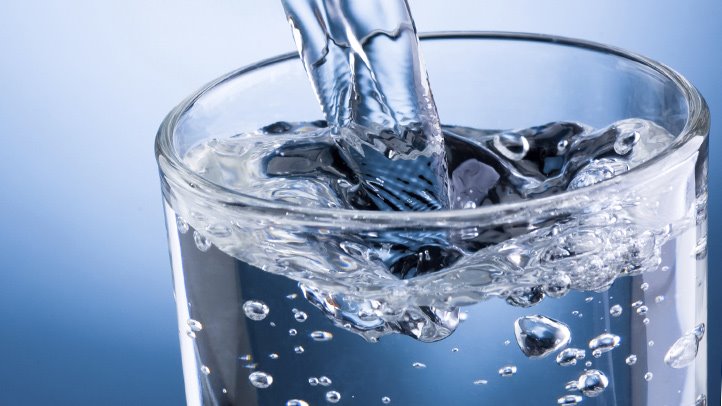
Krystal Stokes
Healthy Living
“Water is the driving force of all nature.”
– Leonardo da Vinci
Here’s a new year’s resolution we can all stick to – make 2019 the year you drink more water!
Adequate water intake is essential for good health. Yet over seventy percent of Canadians in a recent online survey admit they do not drink enough of it. Before you pour yourself a glass of sugary soda or juice, think about this – every single cell in your body (and there are over 37 trillion of them) needs water to function. The human body itself is made up of 65 percent water. Not only do we need water to survive, we need it to thrive. This is especially true for older adults who are at a higher risk of dehydration due to age-related changes.
New Year’s resolution
I recently made a commitment to drink more water and felt the benefits immediately. I used to have a large coffee in the morning and something to drink at lunch. But would often forget to drink anything throughout the rest of my work day. Now I dutifully fill up my water bottle twice a day to ensure I’m getting enough fluids. The first thing I noticed? More energy! Reportedly, even a two percent loss of water in your cells can decrease your level of energy by 20 percent. Orthopedic and Sports Medicine surgeon Dr. R. Navarro explained in a recent Reader’s Digest article why water is the basis for cellular health. “Cells contain water and are surrounded by water. In dehydration, cell membranes become less permeable, hampering the flow of hormones and nutrients into the cell.” When this happens, you will inevitably feel fatigued.
The next thing I noticed? Not as much mindless eating. Have you ever found yourself snacking in the evening in front of the TV after you’ve already eaten supper? I’m guilty of mindlessly munching on my five-year-old’s fruit snacks! In the Reader’s Digest article, Dr. Navarro affirms that people can sometimes mistake hunger for thirst. A glass of water can help you feel full and satisfied. He also explained that, “proper hydration can also serve as an appetite suppressant and help with weight loss or weight management.” So if losing a few extra pounds this year is one of your resolutions, drinking more water can help you achieve that goal!
Water for better health
Water also has a multitude of other health benefits including better digestion and absorption of food (water helps get rid of waste through urine, bowel movements and perspiration), better saliva production (water helps combat dry mouth), lubricated joints (water can help keep the cartilage in your joints lubricated, which aides in shock-absorption) and better cognitive functioning. According to an overview of ‘Water, Hydration & Health’ in the journal Nutrition Review, “Mild levels of dehydration can produce disruptions in mood and cognitive functioning. This may be of special concern in the very young and the very old… dehydration produces alterations in a number of important aspects of cognitive function such as concentration, alertness and short-term memory.”
Subsequently, dehydration can pose a serious health risk for older adults. In fact, according to a report from Statistics Canada, dehydration is one of the most frequent causes of hospitalization for older adults. Daily water consumption declines for people aged 70+ due to a number of age-related, physiological changes including a reduced thirst sensation, which leads to a decrease in fluid intake. Older adults also have lower body water content; everyone will experience about a 15 percent loss in water content over a lifetime.
According to an overview on dehydration from the Mayo Clinic, dehydration can lead to serious health complications such as seizures, and urinary problems, “prolonged bouts of dehydration can cause urinary tract infections, kidney stones and even kidney failure.” The signs of dehydration can include dry mouth and lips, muscle cramps, tiredness, headaches, confusion, dizziness (resulting in an increased risk of falling) and dark yellow, strong smelling urine.
Prevent Dehydration
So how can you prevent dehydration and how much water should you really drink? Here are a few tips and some guidelines to follow from the Dieticians of Canada Association:
- How much fluid you need a day depends on a variety of factors including your activity level, the environment (whether it’s hot and humid) and your overall health. To stay hydrated, the average healthy adult women should have about 9 cups of fluid a day and men should aim for 12. Please note that ‘fluids’ include other beverages as well including juice, milk, tea, broths and soups. Water is considered one of the best fluid choices because it’s calorie free and a great way to quench thirst.
- Try drinking a glass of water as soon as you wake up in the morning and one before eating each meal. Remember to carry a container of water with you wherever you go throughout the day.
- Never ignore thirst! Sip on that water container whenever you feel thirsty.
- Add a slice of lemon or lime to make water more appealing.
- Limit soft drinks as they are high in calories and sugar.
So instead of raising a glass of champagne to ring in the New Year, why not raise a glass of water to a healthier, happier 2019. Your body (and those trillions of cells) will thank you for it!
**Please check with your doctor or healthcare professional if you’ve been told to limit your fluid intake due to a chronic health condition.
Krystal Stokes is the communications and public relations manager at Victoria Lifeline. This article is meant to be informational in nature and should not replace the advice of a trained healthcare professional.

